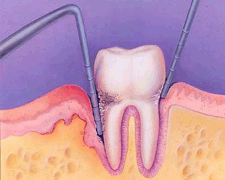المقالات
Pregnancy

During pregnancy, your body produces higher levels of the hormones estrogen and progesterone. These elevated hormone levels can affect many of the tissues in your body, including your gums. As your hormone levels fluctuate, your gums may react strongly and become particularly sensitive. As a result, your gums may become more vulnerable to periodontal disease, an infection of the gums and bone surrounding the teeth, which can lead to tooth loss if left untreated.
In fact, some pregnant women develop "pregnancy gingivitis." This is a condition that causes swollen, red, and tender gums that may bleed when they brush or floss. Gingivitis is an early form of periodontal disease. Pregnancy gingivitis is most likely to appear in the second trimester and peak in the middle of the third trimester. If you already had gingivitis when you became pregnant, it's likely that the condition will worsen as your pregnancy progresses.
Your pregnancy also puts you at risk for developing "pregnancy tumors," which are large, non-cancerous growths around or between teeth that develop from swollen, irritated gums.
Gingivitis and more advanced forms of periodontal disease can affect the health of your baby. Bacteria can enter the bloodstream through infected gums, travel to your uterus, and trigger the production of prostaglandins, a chemical in your body that's believed to cause premature labor. As a result, your baby could be born too early, and too small.
You know how important it is to take especially good care of yourself during your pregnancy, both for your own health and that of your unborn baby. What you may not know is that it's also important to be mindful of your oral health during pregnancy.
You should remove plaque and food debris from your teeth after each meal using dental floss, a toothbrush with soft bristles, and fluoride toothpaste. If toothpaste makes you feel nauseated, you can brush with plain water and then rinse with an anti-plaque or fluoridated mouthwash.
We'll carefully monitor your oral health throughout your pregnancy, cleaning your teeth as needed and evaluating the effectiveness of your home hygiene routine. Be sure to ask us if you have any questions about oral health during your pregnancy. A healthy mouth will help to ensure a comfortable pregnancy and a healthy baby!
